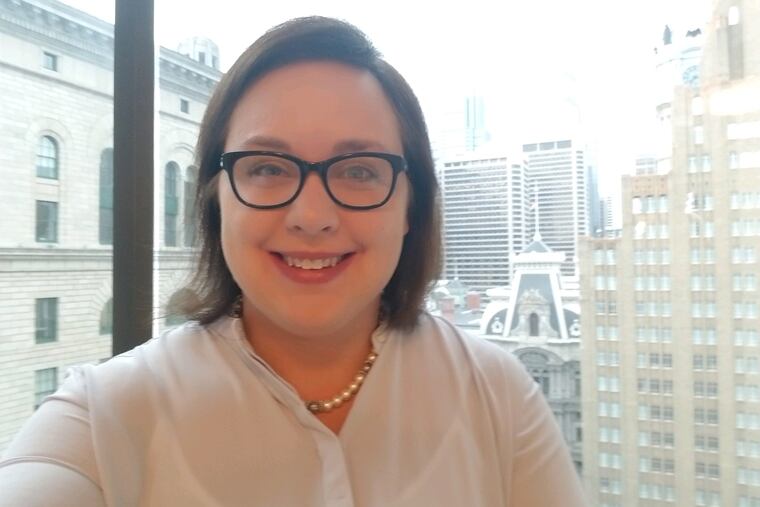College students who don’t use opioids are suffering too, Penn State study suggests
A new survey found a fifth of college students knew someone who was addicted to painkillers or heroin, and a third knew someone who had overdosed. They are friends, family members and caregivers to those suffering from opioid use disorder, and facing unique challenges in that role.

When Kirsten Mears helped a family member enter treatment for opioid use disorder four years ago, she was full of anxiety, fear, and questions.
"Was it something I did that led to this? Was my loved one ever going to get better? How much of my life was about to change?" Mears wondered.
Today, Mears, 29, understands that it wasn't her fault, and her family member is in recovery. But at the time, being a caretaker, which included paying household bills and searching the home for hidden drugs, was difficult, especially as she balanced a full-time job and tried to finish her associate's degree at Bucks County College.
"It took a definite toll," Mears said.
A new survey suggests many college students may be experiencing secondary impacts from the opioid epidemic, similar to Mears. They are friends, family members, and caregivers to those suffering from opioid use disorder, and facing unique challenges in that role.
The survey was conducted by a team of 15 undergraduates from Penn State Lehigh Valley, including Mears, who recently graduated with a bachelor's degree in health-policy administration. As part of a population health class, the researchers surveyed 118 students at a four-year Pennsylvania college during the spring of 2017. They found a fifth of students knew someone who was addicted to painkillers or heroin, and a third knew someone who had overdosed. They presented their findings at the American Sociological Association's annual meeting last week in Philadelphia. (They did not identify the college in order to protect the participants' privacy, because it was a small study.)
The data open a new window on the far-reaching impact of the opioid epidemic for college students, said Jennifer Parker, associate professor of sociology at Penn State Lehigh Valley, who oversaw the project. Most research focuses on those at the center of the crisis — like the 390,000 young adults in the U.S. who had an opioid use disorder in 2016 or the nearly 5,400 youths who died of a drug overdose that year. But little is known about people like Mears.
"This is an invisible population," Parker said. "Little attention is being brought to [college students] who have experienced these devastating losses."
Because the study is small, more research is needed to confirm the results. Parker said the main goal was to start a conversation about secondary exposure.
The survey did not collect information on how students' mental and emotional well-being or academic performance was affected by knowing someone with opioid use disorder. But Bill Stauffer, executive director of Pennsylvania Recovery Organizations Alliance, says he's traveled around the state talking to families affected by the opioid epidemic and seen many cases where the trauma of losing someone has lifelong consequences. "People often feel depressed, isolated, and powerless in the face of the deaths occurring around them," he said.
One way to alleviate that is to open up the conversation around opioid use so students know they're not alone in experiencing the death of a loved one, Stauffer said.
The survey also points to the need to better educate college students about opioid use disorder. Sixty percent of students reported they wouldn't know what to do in the event of an overdose. While an equal percentage said they knew where to find that information, "in the case of an overdose, that could be too late," Parker said.
Mears agreed. In her experience, the information is there if you seek it out. "Once a loved one has experienced an overdose, then all that relevant information comes to light," she said. But there needs to be more efforts in prevention. "We offer CPR classes in high school, why not Narcan certification?" she said, referring to the brand name of naloxone, a medication that can reverse an overdose.
>>READ MORE: College campuses distribute condoms. Why not Narcan?
The Pennsylvania Department of Drugs and Alcohol offers links on its website to online training for administering naloxone. In Philadelphia, the Department of Behavioral Health and Intellectual disAbility Services offers in-person training, as does Prevention Point, a harm-reduction program in Kensington.
Stauffer said learning to use naloxone can give friends and family a sense of control over what's happening around them.
That might be especially important for female students, who according to the survey results worry more than men about someone they know misusing pain medication. It could mean more women than men are in a caretaker role, Parker said. But more research is needed to know for sure.
Parker plans to repeat the survey every two years, starting in spring 2019. She hopes to include more questions on students' mental and emotional health, and expand the survey to more universities.